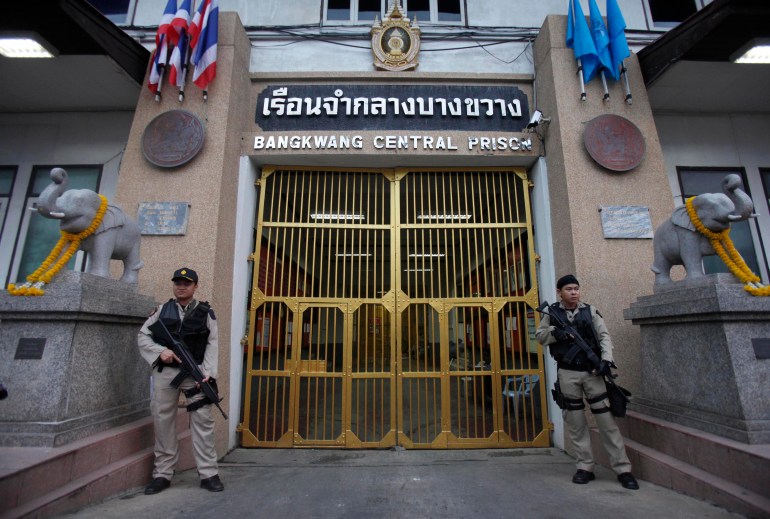Who is Viktor Bout, Russian man at centre of US prisoner ‘swap’?
Reports say US has proposed to Russia to release convicted arms dealer for Brittney Griner and Paul Whelan.

Published On 28 Jul 2022
The United States government has reportedly offered to free Viktor Bout, an imprisoned Russian arms dealer, in exchange for the release of basketball star Brittney Griner and former US marine Paul Whelan, who are held by Russian authorities.
Here is what to know about Bout, who was once dubbed the “Merchant of Death” and is currently serving a 25-year prison sentence.
Who is Viktor Bout?
- Bout is believed to have been born in then-Soviet ruled Dushanbe, Tajikstan, in 1967. He was a former Soviet military translator who began his career in air transport in the early 1990s following the collapse of the Soviet Union.
- According to reports, his father was an auto mechanic, and his mother was a bookkeeper; he also had a brother.
- “Viktor was the adventurous son … copying banned pop songs to earn a little extra pocket money, and teaching himself Esperanto in the belief that it would come in handy later in life,” German news weekly Der Spiegel reported in 2010.
- He joined the Communist Union of Youth while he also attended the Military Institute of Foreign Languages in Moscow.
- During his time in the military, he was sent to Mozambique and Angola to work as a translator.
- After the Soviet Union collapsed, Bout bought a fleet of old military cargo planes, according to a Time report and started an air freight business.
- He is the subject of the book, Merchant of Death, written by investigative reporters Douglas Farah and Stephen Braun, and is also believed to have been the inspiration for the character played by Nicolas Cage in Lord of War, a Hollywood-produced film released in 2005.
From Africa to Afghanistan to Iraq
- According to reports, there were times when Bout’s business legally provided services to the French government, the United Nations and the US.
- However, according to Amnesty International, he was also implicated in violating or contributing to violating UN arms embargoes in Angola, Sierra Leone, Liberia and the Democratic Republic of the Congo.
- Bout also acknowledged having been to Afghanistan in the 1990s but denied the charge that he had supplied the Taliban.
- Documents have shown that Bout’s company was one of those contracted by the US government to fly supplies into Iraq after the 2003 invasion.
- In 2003, Peter Hain, a former minister in Britain’s foreign ministry, said: “Bout is the leading merchant of death who is the principal conduit for planes and supply routes that take arms … from East Europe, principally Bulgaria, Moldova and Ukraine to Liberia and Angola.”
What led to his arrest?
- US authorities had been attempting to prosecute Bout since the early 2000s – even as it had contracted his company to provide logistical support for the Iraq invasion.
- However, US authorities were held back by the lack of any law they could charge him under.
- In 2008, agents from the US Drug Enforcement Agency, posing as buyers for Colombia’s FARC rebels, were able to gain an introduction to Bout and his company.
- Shortly after they had discussed possible arms shipments with him, he was arrested by authorities in Thailand before being extradited to the US.
- Bout was charged only in connection with the suspected arms deal, but US authorities say he has been involved in trafficking arms since the 1990s.
- He was sentenced to 25 years in prison and convicted on terrorism charges in 2012.
- He has always said that he operated legitimate businesses and was a logistics provider.
- In sentencing, District Judge Shira Scheindlin said the minimum sentence was appropriate because there was no evidence that Bout would have committed the crimes for which he was convicted had it not been for the sting operation.
- In an interview with CNN in 2002, he said: ” I’m not afraid. I don’t have anything in my life for what I should be afraid of. And this whole story looks to me like a witch hunt.”
- Russia’s foreign ministry rejected Bout’s sentencing, saying the charges amounted to “a political order”. The Kremlin has for years demanded his release.

What do we know about the reported prisoner swap?
- The potential deal is the latest development in a continuing US effort to obtain the release of Griner and Whelan, who the US alleges are being wrongfully detained by Russia.
- Olympic gold medallist Griner was arrested over charges of possessing cannabis oil while former marine Whelan was imprisoned on espionage charges.
- “We put a substantial proposal on the table weeks ago to facilitate their release,” US Secretary of State Antony Blinken said on Wednesday.
Source: Al Jazeera and news agencies